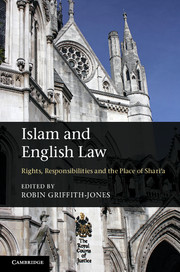Book contents
- Frontmatter
- Contents
- List of contributors
- List of abbreviations
- Preface
- Introduction
- Part I The Archbishop of Canterbury and shariʽa law
- Part II The Archbishop’s proposal for ‘transformative accommodation’
- Part III Responsibilities and rights
- Freedom of speech, incitement to religious hatred: beyond the divide?
- Religion, the state and the meaning of ‘jihad’
- 16 Towards an Islamic society, not an Islamic state
- 17 Following shariʽa in the West
- 18 Violence, personal commitment and democracy
- Part IV Prospect: equality before God and before the law
- Select bibliography
- Index of cases
- Index
- References
18 - Violence, personal commitment and democracy
Published online by Cambridge University Press: 05 April 2013
- Frontmatter
- Contents
- List of contributors
- List of abbreviations
- Preface
- Introduction
- Part I The Archbishop of Canterbury and shariʽa law
- Part II The Archbishop’s proposal for ‘transformative accommodation’
- Part III Responsibilities and rights
- Freedom of speech, incitement to religious hatred: beyond the divide?
- Religion, the state and the meaning of ‘jihad’
- 16 Towards an Islamic society, not an Islamic state
- 17 Following shariʽa in the West
- 18 Violence, personal commitment and democracy
- Part IV Prospect: equality before God and before the law
- Select bibliography
- Index of cases
- Index
- References
Summary
To engage in jihad means to strive or exert oneself in a struggle to achieve a morally laudable or just aim. For all the sensationalism stirred by the term jihad, this is its indisputable definition in Islamic theology and law. The meaning of jihad is both this straightforward and simple and also this complex and indeterminate. Jihad could be in the form of armed struggle, but (as explained below) the use of violence could also be considered as a most serious and grave moral crime, that of causing corruption or ruin on earth (fasad fi al-ard).
Although the term jihad has been appropriated and co-opted in very diverse contextual and historical circumstances, in Islamic theology there is an inherent and integral relationship between the concept of jihad and the Qurʾanically mandated normative obligation to pursue what is good and to avoid what is bad (al-amr biʾl maʾruf wa al-nahy ʽann al-munkar). By definition, moral worthiness and the justness of the cause are categorical preconditions for the existence and recognition of jihad or for a Muslim to be in a state of jihad (n. mujahid). In the classical philosophical and theological discourses, and especially in the apologetics of kalam, there is a vast and complex Islamic scholastic tradition investigating the definition and nature of moral goodness and what constitutes a just cause. In books of classical Islamic legal theory or jurisprudence (usul al-fiqh), as opposed to books on Islamic positive law (ahkam), there is a much more abridged and narrower discourse on what constitutes a legally recognisable just cause, or what may be considered a valid normative obligation as a matter of law.
- Type
- Chapter
- Information
- Islam and English LawRights, Responsibilities and the Place of Shari'a, pp. 256 - 272Publisher: Cambridge University PressPrint publication year: 2013



